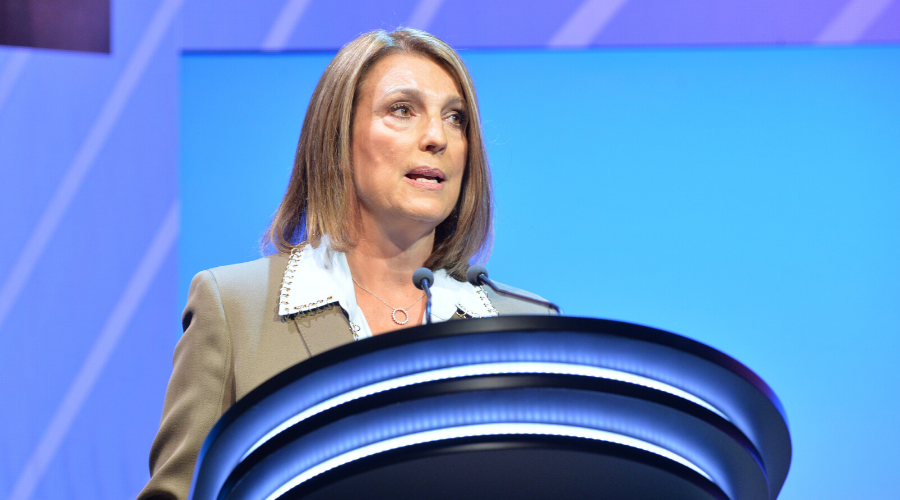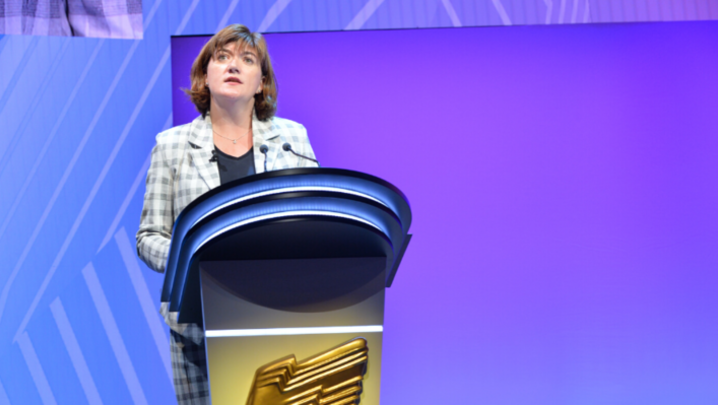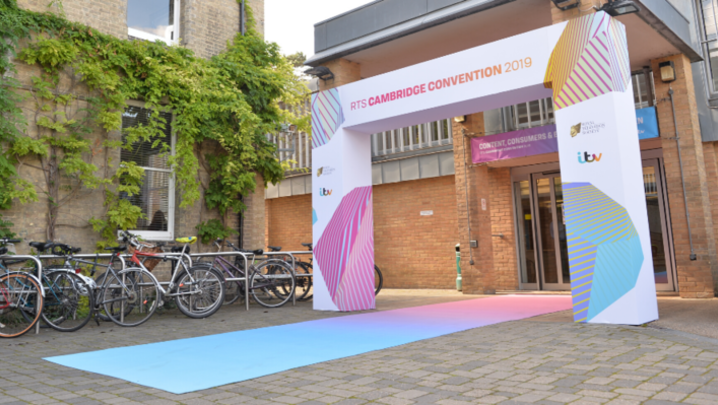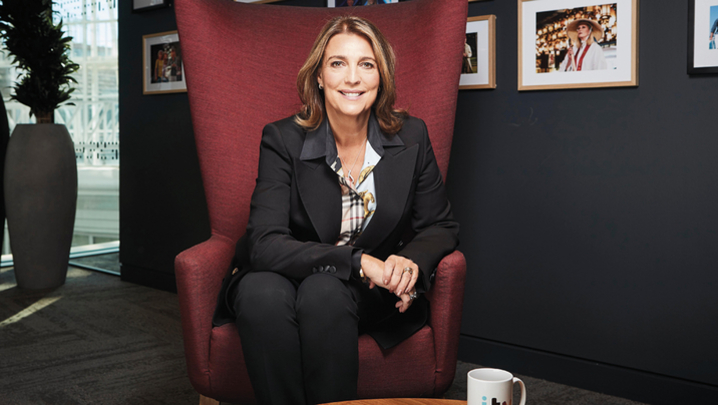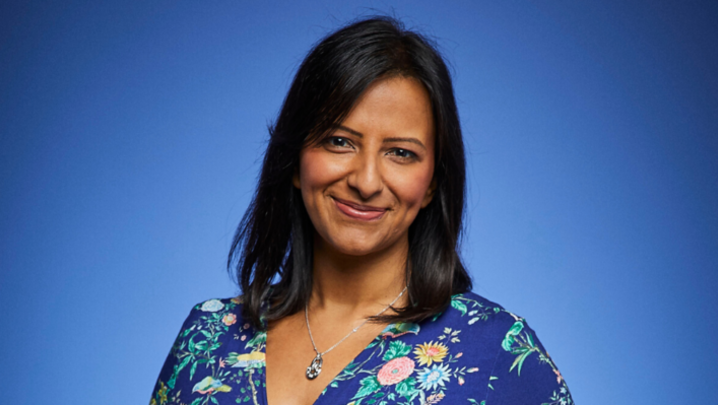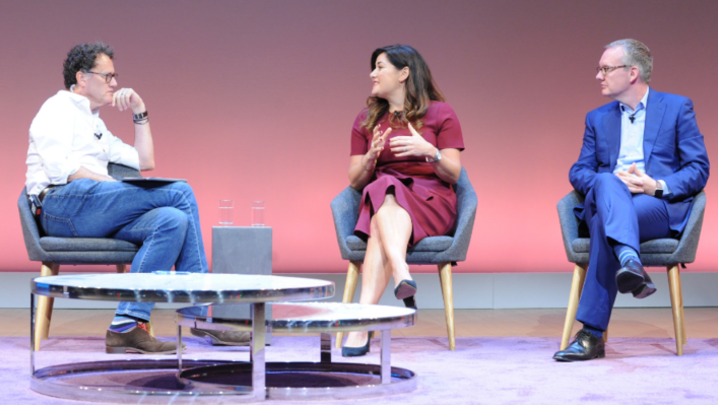Carolyn McCall argues that television has a bright future despite the blizzard of change
Shifting viewing habits, developments in technology and the rapidly evolving competitive landscape are having a fundamental impact on our industry,” argued RTS Convention Chair Carolyn McCall as she opened Cambridge 2019.
But amid the change and uncertainty, which included Britain’s future relationship with Europe and the rest of the world, McCall maintained that television had a bright future.
“[Viewers] are looking for creative, trusted producers and broadcasters to help them both navigate and understand the world in which we are living and, as importantly, to help them escape from it into other dramas,” she said. “Trust in TV news is remarkably high – higher than all other media and, of course, much more valued than the news provided by social media.
“In fact, in an era of fake news and misinformation, the importance of the news provided by public service broadcasters, in particular, has never been more important to our democracy.”
However, young people saw traditional TV bulletins as “for their mums and dads”, admitted McCall. ITV’s response, she revealed, is a new social media news service for teenagers, The Rundown. The ITV CEO argued that viewers are increasingly watching shows when they want: “Every month, 80% of UK households watch video-on-demand in one form or another.”
Nevertheless, she added, “the ‘linear familiar’ is still going strong – with 84% of total broadcast viewing still taking place live. The challenge for all of us – in business, in government and in regulation – is to strike the right balance in what we do between these two worlds.”
In conversation with Good Morning Britain presenter Susanna Reid, McCall added more flesh to her speech, outlining how ITV was planning to respond to this changing TV landscape.
“All of us are dealing with challenging issues because it’s a time of great change in the industry,” she said. “If viewer habits are changing and you can see them unfolding in front of you, you have to respond to that.”
The CEO argued that the ITV model was not broken – but that the broadcaster would have to innovate to prosper: “The linear, free-to-air model is a really successful model, it’s ad-funded and it will last for a long time. But you have to think of how you diversify as well.” McCall identified in-house production company ITV Studios and the new BBC/ITV VoD service BritBox as two pillars of diversification.
She claimed that BritBox, which is due to launch before the end of the year, would be “distinctive”, offering “the breadth and depth of British-originated content” and representing “good value” at £5.99 a month.
“I am very optimistic about the future because the core of what we do is programmes, content and engagement – we create audiences all the time and we do that because we have such powerful content,” continued the ITV CEO. “We will always do advertising, but we will not just be doing linear advertising, we will also do more targeted advertising through technology.”
McCall admitted that attracting younger viewers is more of a challenge: “You have to work much, much harder on telly to reach [them] today”. But she pointed out that it wasn’t just Love Island that was pulling in a younger audience on ITV channels: “Over 50% of 16-24s watch I’m a Celebrity… – people wouldn’t expect that.… When you get it right content-wise for them, they come.”
The ITV CEO added: “We don’t mind how they watch it.… If they’re going to watch our content on their mobiles, that’s fine.”
Session One, ‘Content, consumers and everything in between’, featured: Carolyn McCall, CEO, ITV; Neil Mortensen, director of audiences, ITV; and Kevin Lygo, director of television, ITV. It was chaired by journalists and broadcasters Susanna Reid and Ranvir Singh, and produced by Neil Thompson, Sally Watson and Nick Caldon. Reports by Matthew Bell and Steve Clarke.
The People’s Panel get their say

Susanna Reid introduced a group of viewers from Leeds who made up the People’s Panel: ‘No one is more important than our audience. We totally rely on our viewers.’
The line-up, facilitated by GMB political editor Ranvir Singh included Sabrina, 36, Phil, 51, Sandi, 72, Josh, 20, Carrie, 49, Phillip, 34, Steven, 64, and Marie, 46.
Their tastes were wide-ranging. Grandmother and part-time charity worker Sandi likes to watch daytime TV and is a big fan of Piers Morgan. ‘I know, if something has happened the day before, something is going to come out of his mouth to tell us all about it – his version and nobody else’s.’
She added: ‘I like outspoken presenters – Janet Street-Porter and Piers. They say what they think, probably what we’d like to say but daren’t. It’s never vulgar, it’s honest.
‘Even disagreeing makes you feel you’re engaging.’
At the other end of the age spectrum was university student Josh, who watches TV on his mobile. Love Island is among his favourite shows.
Disabled single mum Carrie enjoys documentaries and drama but thought that news and entertainment programmes lacked diversity: ‘There’s no newsreader in a wheelchair, there’s no one with a prosthetic leg presenting The X Factor.’
Phillip likes Peaky Blinders and anything starring Ricky Gervais. ‘On an evening, we usually watch a couple of hours. It’s difficult deciding what to watch so we’ll toss a coin to decide who gets to choose,’ he said.
Steven prefers shows featuring fast cars. He and his partner live in separate homes. ‘We have very different interests – I like action programmes, she likes soaps and reality shows such as Love Island, which is not my cup of tea, but we both like natural history.”
Reality shows are top of school teacher Marie’s viewing menu, especially The Real Housewives of Cheshire.
‘I like to see the lifestyles of the rich and famous,’ she said. Their glamour is far removed from her own life.
Sabrina enjoys binge-watching dramas, such as Doctor Foster and Killing Eve. ‘I watch the ones I’ve heard about on social media,’ she said. ‘And I don’t just watch the one, I carry on watching.’
Tried, tested and addictive

Anthony McPartlin and Declan Donnelly
(Credit: RTS/Richard Kendal)
Discussing the strong ratings currently enjoyed by his channel, ITV director of television Kevin Lygo highlighted soaps, which ‘are easily overlooked’. He added: ‘If you don’t watch soap opera and catch a tiny bit of one, it does look appalling. But, if you watch it all the time, it’s the best thing in your life.
‘I’m addicted to Coronation Street… and I haven’t missed an episode since the 1970s.’
Lygo stressed the importance of long-established shows to a broadcaster’s schedules. ‘A lot of our big entertainment shows have been running for years and years, and I don’t think they were ever designed to do that. Everyone who started those shows would be amazed that they’re still running and doing such huge numbers. It’s a testament to the programme-makers who reinvent them all the time.’
Mentioning I’m a Celebrity…, Britain’s Got Talent and Strictly Come Dancing, Lygo added: ‘It’s amazing that you still get 10 million people to come to these shows in the modern world when there’s so much choice.’
New shows, however, are often culled before they have time to find their feet. ‘It’s harder – and it’s the great tension between producers and broadcasters – to give shows more time. The modern experience, I’m afraid, is more brutal than it ever used to be, because there is so much choice,’ admitted Lygo. ‘The hits are easy, the failures are easy – it’s the ones in between, where the producer is on his knees begging you for another series… that’s quite hard.’
Star ITV presenters Ant and Dec, beamed into the conference from the Good Morning Britain studio in London, offered their take on live TV.
‘You want to watch it then and there and don’t want to deal with catch-up [TV],’ said Anthony McPartlin.
‘You try to make it unmissable… and get the family together on the sofa to watch the TV and share that event,’ added Declan Donnelly.
With countless seasons of I’m a Celebrity…, Saturday Night Takeaway and Britain’s Got Talent under their belts, the duo are experts in live entertainment shows. ‘Time for a new one, guys,’ joked Lygo.
TV: you’ve never had it so good
‘Our research tells us that viewers have never been happier,’ said ITV director of audiences Neil Mortensen. ‘They’re excited about the way TV is going, as the balance of power shifts towards them.…
‘Mainstream viewers are becoming less anchored in the schedule.… For some demographics, broadcast TV only represents half of their viewing and, for younger audiences, they watch less live TV year after year.…
‘Fewer ads are seen in real time and, at the same time, platforms are multiplying and prominence diminishing.
‘So it’s harder for a show to cut through and even harder for the ads to [do so]. It can sometimes feel like there isn’t much of a case for optimism, but we can safely say that television isn’t facing an existential threat any time soon.…
‘In the modern TV era, there have always been around four hours a day of TV viewing up for grabs. That hasn’t changed much as TV continues to deliver on basic human needs in a simple, cost-effective and primary way.
‘The future will continue to throw up disruption, technological battles [and] economic battles. But, for the viewer, it is a creative battle. And that’s something we should all be looking forward to with confidence.’

